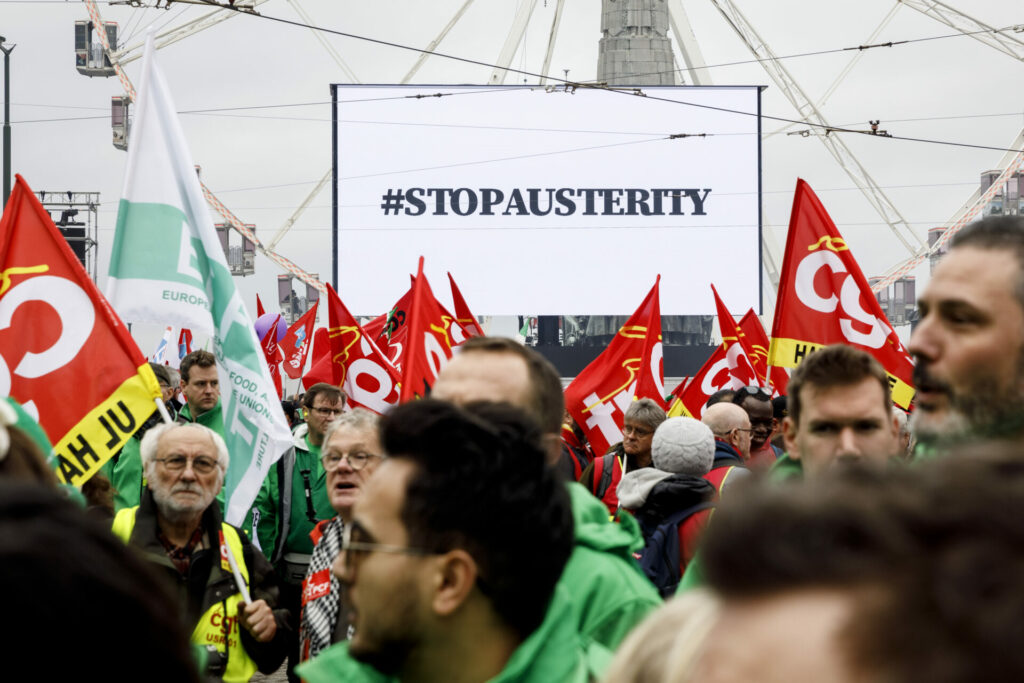MEPs approved new fiscal rules for the EU during a plenary session on Tuesday despite an ongoing campaign by trade unions to prevent "austerity 2.0" from passing through.
"This reform constitutes a fresh start and a return to fiscal responsibility," said co-rapporteur Makrus Ferber (EPP – Germany). "The new framework will be simpler, more predictable and more pragmatic. However, the new rules can only become a success if properly implemented by the Commission."
The regulation passed with 359 votes in favour, 166 against and 61 abstentions, with conservatives, liberals and socialist groups helping to get the text over the line.
Advocates of the reform say it heralds a return to fiscal control after a more lax approach during the Covid-19 pandemic. Member States will now be required to keep budget deficits at less than 3% of national GDP. In addition, countries with excessive debt will be required to reduce it on average by 1% per year if their debt is above 90% of GDP, and by 0.5% per year on average if it is between 60% and 90%.
'Straitjacket'
European and Belgian trade unions have led a long campaign denouncing the reforms as a "Europe-wide return to austerity".
According to ETUC General Secretary Esther Lynch, 18 Member States including Germany, France, Italy, Spain and Poland would be unable to meet the required minimum level of investment in housing, healthcare and education under the new rules. In addition, only three Member States – Sweden, Ireland and Denmark – will be able to meet the social and climate investments required of them.
"This agreement, forced by the austerity approach of some European capitals, will require member states to reduce their debts rapidly and in ways that are economically and socially unsustainable," ETUC stated on the eve of the vote. "This will mark a return to austerity. At the same time, the new rules will also act as a disincentive to invest towards the social and climate objectives EU member states have agreed upon, by limiting the marge of manoeuvre of public deficit."
🔴The European Parliament has voted for strict new spending limits
Europe must meet these limits through taxes on corporations recording record profits not cuts for workers suffering a historic drop in living standards The fight to stop austerity 2.0 continues pic.twitter.com/Uap6cbyD9u — EUROPEAN TRADE UNIONS (@etuc_ces) April 23, 2024
Similarly, Belgian MEP and President of the European Greens/EFA group Philippe Lamberts (Ecolo) drew attention to the social and environmental cost of tighter economic measures. "These new budgetary rules will impose a straitjacket on all EU Member States," he said on Monday. "It will deprive governments of the financial resources needed to guarantee a thriving economy, social services and climate action."
Other political groups in the European Parliament acknowledge that the reforms are imperfect, but necessary nonetheless. "There is no doubt that this deal is much better than no deal and going back to the old rules or having no rules at all," said co-rapporteur Margarida Marques (S&D – Portugal).
Right-wing and far-right political groups welcome a more stringent approach to EU budgetary rules. "There are a number of Member States who have gone too far in debt financing and this is a potential danger which can't be justified nationally or EU-wide," said MEP Johan Van Overtveldt (ECR/N-VA – Belgium). This echoes positions of "frugal" countries such as Germany, who fear another bail-out in the worst-case scenario.
Tax the rich
Tuesday's vote has not stopped the opposition campaign in its tracks. ETUC, the trade union leading the fight, has now emphasised the need to "tax the rich" as a solution to the EU's budgetary difficulties.
"Working people who have suffered a historic drop in living standards as a result of the pandemic and cost-of-living crisis simply don’t have anything left for politicians to take," stated Lynch in a press release published in the wake of the vote. "Instead politicians who supported these fiscal rules should have the decency to meet them through taxes on the corporations which registered record breaking profits which fueled inflation."
The vote on the budgetary reforms is one of almost 90 to take place during the Strasbourg plenary this week. This is the last time MEPs will convene before the end of the mandate and there is a palpable sense of urgency to deliver to voters before European elections on 9 June.

